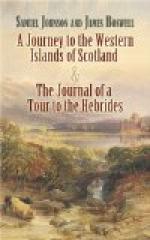Col is computed to be thirteen miles in length, and three in breadth. Both the ends are the property of the Duke of Argyle, but the middle belongs to Maclean, who is called Col, as the only Laird.
Col is not properly rocky; it is rather one continued rock, of a surface much diversified with protuberances, and covered with a thin layer of earth, which is often broken, and discovers the stone. Such a soil is not for plants that strike deep roots; and perhaps in the whole Island nothing has ever yet grown to the height of a table. The uncultivated parts are clothed with heath, among which industry has interspersed spots of grass and corn; but no attempt has yet been made to raise a tree. Young Col, who has a very laudable desire of improving his patrimony, purposes some time to plant an orchard; which, if it be sheltered by a wall, may perhaps succeed. He has introduced the culture of turnips, of which he has a field, where the whole work was performed by his own hand. His intention is to provide food for his cattle in the winter. This innovation was considered by Mr. Macsweyn as the idle project of a young head, heated with English fancies; but he has now found that turnips will really grow, and that hungry sheep and cows will really eat them.
By such acquisitions as these, the Hebrides may in time rise above their annual distress. Wherever heath will grow, there is reason to think something better may draw nourishment; and by trying the production of other places, plants will be found suitable to every soil.
Col has many lochs, some of which have trouts and eels, and others have never yet been stocked; another proof of the negligence of the Islanders, who might take fish in the inland waters, when they cannot go to sea.
Their quadrupeds are horses, cows, sheep, and goats. They have neither deer, hares, nor rabbits. They have no vermin, except rats, which have been lately brought thither by sea, as to other places; and are free from serpents, frogs, and toads.
The harvest in Col, and in Lewis, is ripe sooner than in Sky; and the winter in Col is never cold, but very tempestuous. I know not that I ever heard the wind so loud in any other place; and Mr. Boswell observed, that its noise was all its own, for there were no trees to increase it.
Noise is not the worst effect of the tempests; for they have thrown the sand from the shore over a considerable part of the land; and it is said still to encroach and destroy more and more pasture; but I am not of opinion, that by any surveys or landmarks, its limits have been ever fixed, or its progression ascertained. If one man has confidence enough to say, that it advances, nobody can bring any proof to support him in denying it. The reason why it is not spread to a greater extent, seems to be, that the wind and rain come almost together, and that it is made close and heavy by the wet before the storms can put it in motion. So thick is the bed, and so small the particles, that if a traveller should be caught by a sudden gust in dry weather, he would find it very difficult to escape with life.




